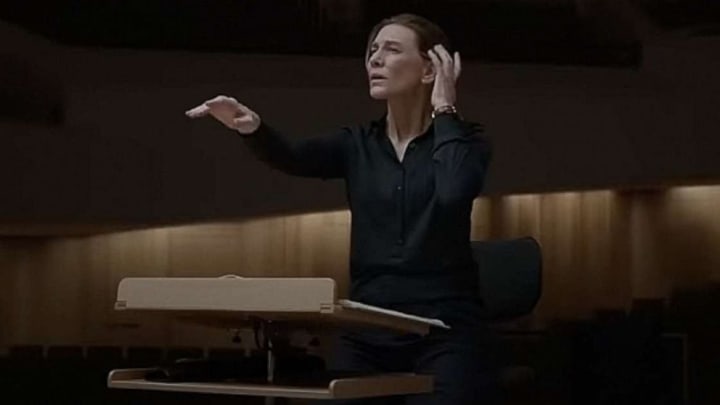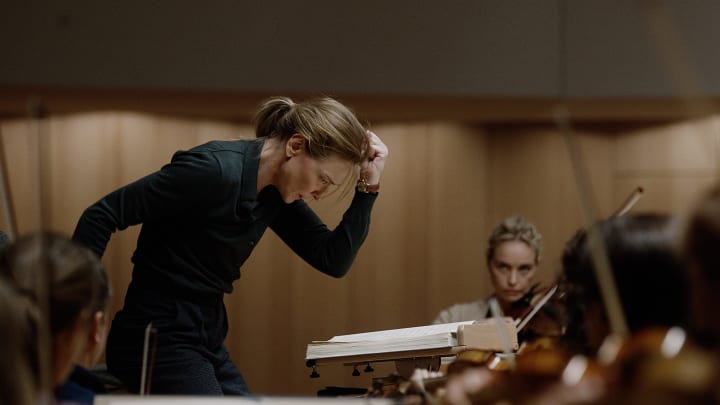Spoiler Alert: Let's Talk About the Ending of 'Tar'
The ending of Tar has caused a great deal of debate in film culture. I think the ending is perfect.

Tar (2022)
Directed by Todd Field
Written Todd Field
Starring Cate Blanchett
Release Date October 7th, 2022
The movie Tar ends with the title character, Lydia Tar, played by Cate Blanchett, conducting an orchestra somewhere in Vietnam. As Lydia takes the stage and begins leading the symphony, the camera begins to move away from her and into the audience where we find people dressed in various different costumes. These are cosplayers and I am told that this is in relation to a popular video game though that is not specified in the film.
What does this pull back and reveal mean? Let’s provide some context before we begin a more thorough examination of this ending. First of all, the fictional character, Lydia Tar, is a famous conductor and composer. She was the first female conductor of the famed Berlin Philharmonic and was building toward a crowning achievement, the recording of Mahler’s 5th Symphony. Having led recordings of each of Mahler’s Symphony, the 5th would make her one of the few published conductors to have captured all of Mahler’s symphonies.

That may not mean much to you if you aren’t part of the cloistered elite of the classical music fandom. I certainly was not aware that such a thing was either uncommon or at all special until this movie made clear what an achievement this truly is. Unfortunately for Lydia Tar, her actions in her private life cause her to lose this monumental, career defining opportunity. Having been accused of sexual misconduct with a former mentee, and having gone viral in a video where she appeared to be bullying a BIPOC student over their lack of respect for classical conductors, Lydia has a mental breakdown.
She ends up forced out of her dream performance of Mahler’s 5th and instead attacks her replacement conductor on the piece as he’s beginning the performance, in front of a full audience at the Berlin Philharmonic. It appears that she has completely destroyed her reputation and career. She has, even before this very public meltdown, lost her family, her wife left her and took their adopted child because, again, Lydia’s behavior has come to light and she’s not handling it well.

Having met with a crisis management team in New York City, Lydia is desperate for a way back to being a conductor. Thus, she travels to Vietnam, she is confronted by several indignities, she sets to work on adapting the music of a composer and the work appears to give her purpose again. Then, in the final moments, we see what Lydia has been working on, the composed score for a popular video game.
Instead of conducting the Berlin Philharmonic playing Mahler’s 5th, she’s conducting in front of a large group of video game cosplayers, leading an orchestra in a relatively benign score. How does Lydia feel about this? We don’t really know. Are we intended to take this as her comeuppance for her terrible behavior? Is this karmic justice for her misdeeds? Director Todd Field leaves this a blank space for you to draw your own conclusions.

My first feeling regarding this ending was one of revulsion and apprehension. I wondered if this movie was insulting the audience, using their fandom as a punching bag. I wanted to protect the cosplayers from the judgmental attitude of the director. Thankfully, I talked myself out of these feelings. I don’t believe Todd Field meant any disrespect to cosplayers or the work that they dedicate their love to. The broad net that Todd Field is casting via this scene is one in which we must contemplate Lydia and her perspective, or lack of perspective, on where she is now in her career.
It’s fair to say that Lydia Tar would much rather be conducting Mahler’s 5th with some of the finest players in all of classical music than conducting a video game score at a fan convention. From the perspective of high and low culture, Lydia’s downfall is judged as one wherein an egomaniacal character must humble themselves in order to retain a connection with what they love to do. Lydia is perhaps humbled by having to go from the Berlin Philharmonic and the perception that entails among her peers to a space that is in some perspective low, or popular culture.

The ending is rather perfect. It’s a final underline of the fall from grace theme that encapsulates the story of Lydia Tar. It’s a message to the audience that there are consequences to actions even when those actions aren’t specifically criminal or punishable by law. It’s also a point of potential redemption. Perhaps Lydia Tar’s talent and desire can elevate this seemingly low material into something more. Perhaps Lydia will come to respect wider culture and become more sensitive to and open to the outside world. Or she is entirely unrepentant and just chasing paychecks.
That’s what Todd Field is leaving open to our outsider interpretation. We can choose a happy redemptive, hopeful ending or a cynical unhappy ending. This choose your own adventure reading of the ending of Tar will not satisfy all audiences. If you want direct answers and a concrete resolution, this is not the movie for you. The challenge that Todd Field and Cate Blanchett leave us with is one that calls on us to define ourselves, hopeful and redemptive or cynical and expecting the worst.

Thus, why I find the ending of Tar perfect. It’s more challenging than I first thought. It’s much more daring and bold than I initially believed it to be. My knee jerk sensitivity and cynicism took hold immediately after the movie but went away as I gave the film a more thorough and thoughtful examination. Now, after writing this article, I feel the ending is more than merely justified, it’s necessary. It’s the definition of the movie. It’s the ultimate statement of the film, can you believe in redemption or have you given yourself to cynicism. It’s not a right or wrong answer, it’s one that forces you to confront your feelings and uneasy ideas about modern culture.
It’s a perfect ending.
Find my archive of more than 20 years and nearly 2000 movie reviews at SeanattheMovies.blogspot.com. Follow me on Twitter at PodcastSean. Follow my archive blog on Twitter at SeanattheMovies. Listen to me talk about movies on the Everyone’s a Critic Movie Review Podcast. If you have enjoyed what you have read, consider subscribing to my work here on Vocal. And if you’d like to support my writing you can do so by making a monthly pledge or by leaving a one time tip. Thanks!
About the Creator
Sean Patrick
Hello, my name is Sean Patrick He/Him, and I am a film critic and podcast host for the I Hate Critics Movie Review Podcast I am a voting member of the Critics Choice Association, the group behind the annual Critics Choice Awards.






Comments (1)
I agree with you are I’ll add that Lydia herself foreshadows her end when, toward the beginning of film, she talks about sublimating yourself. Merriam-webster defines sublimation as this: “to divert the expression of (an instinctual desire or impulse) from its unacceptable form to one that is considered more socially or culturally acceptable”. Rather than the cosplayers being the object of ridicule, could the ending be saying Lydia is the one who is out of step with them?